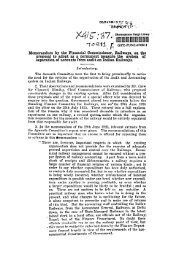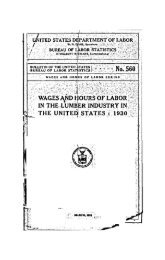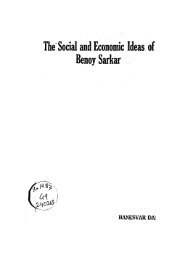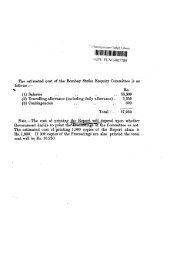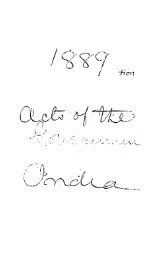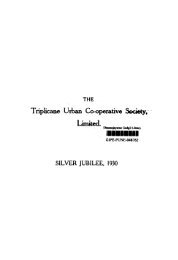- Page 1:
Dhananjayarao Gadgil Library . 1111
- Page 4 and 5:
(') . \ , l '~/
- Page 6 and 7:
PREFACE These studies in applied ec
- Page 8 and 9:
The material for these studies in w
- Page 10 and 11:
vii The material for these studies
- Page 12 and 13:
of economic theory and history to t
- Page 14 and 15:
Preface CONTENTS Principles of Cont
- Page 16 and 17:
CHART I The Three Equations of Comp
- Page 18 and 19:
2 PRINCIPLES OF CONTROL OVER Accord
- Page 20 and 21:
4 PRINCIPLES OF CONTROL OVER office
- Page 22 and 23:
6 PRINCIPLES OF CONTROL OVER Privat
- Page 24 and 25:
8 PRINCIPLES OF CONTROL OVER consis
- Page 26 and 27:
10 'PRINCIPLES OF CONlROL OVER to m
- Page 28 and 29:
12 PRINCIPAL OF CONTROL. OVER and b
- Page 30 and 31:
14 PRI;..JCWLES OF CONTROL qVER The
- Page 32 and 33:
16 PRINCIPLES OF CONTROL OVER :are
- Page 34 and 35:
'.. I~. [>RINCIPLES OF CONTROL. OVE
- Page 36 and 37:
o 20 PRI~CIPLES . OF COXIROL OVER w
- Page 38 and 39:
u'Ll:;300:000' 'Iewasfur·
- Page 40 and 41:
The Re-piaking of the Reicbsbank an
- Page 42 and 43:
.fQ:ndioning, first and foremost, I
- Page 44 and 45:
28 THE RE~MAKING OF THE REICH5BANK
- Page 46 and 47:
3'0. THE RE~MAKING .OF THE REICHSBA
- Page 48 and 49:
32 THE RE-MAKING .oF THE REICHSBANK
- Page 50 and 51:
34 THE RE-MAKING OF THE REICHsBANK
- Page 52 and 53:
36 THE RE-MAKING OF THE REICHSBANK
- Page 54 and 55:
38 THE RE-MAKING OFTHEREICHSBANK Do
- Page 56 and 57:
40 THE RE-MAKING OF THE RElCHSBANK
- Page 58 and 59:
42 THE RE-MAKING OF THE REICHSBANK
- Page 60 and 61:
44 THE RE-MAKING OF THE REICHSBANK
- Page 62 and 63:
46 THE· RE-MAKING OF THE REICHSBAN
- Page 64 and 65:
~8 . THE RE-MAKING OF THE REICHSBAN
- Page 66 and 67:
50 THE RE~MAKING OF THE REICHSBANK
- Page 68 and 69:
52 THE RE-MAKING OF THE REICHSBANK
- Page 70 and 71:
54 THE RE-MAKING OF THE REICHSBANK
- Page 72 and 73:
56 THE RE~MAKING OF THE RElCHSBANK
- Page 74 and 75:
58 THE RE-MAKING OF THE RElCHSBANK
- Page 76 and 77:
60 THE RE-MAKING OF THE REICHSBANK
- Page 78 and 79:
(>2 THE RE-MAKING OF THE REICHSBANK
- Page 80 and 81:
64 THERE-MAKING OF THE REICHSBANK m
- Page 82 and 83:
66 THE RE~MAKING O~ THf: REICHSBANK
- Page 84 and 85:
AND THE BANQUE~DE FRANCE 67 Bills D
- Page 86 and 87:
CHART III Banque de France t/isat/i
- Page 88 and 89:
;gO THE RE~MAKING OF THE REICHSBANK
- Page 90 and 91:
7.2 TIlE RE-MAKING OF THE REICHSBAN
- Page 92 and 93:
H THE RE~MAKING 01;' THE REICHSBANK
- Page 94 and 95:
76 THE RE-MAKING' OF THE REICHSBANK
- Page 96 and 97:
78 THERE-MAKING 01;' THE,REICHSBANK
- Page 98 and 99:
'So THE RE-MAKING OF THE REICHSBANK
- Page 100 and 101:
The Bank Capitalis,m of Young Benga
- Page 102 and 103:
84 THE BANK CAPITALISM OF YOUNG BEN
- Page 104 and 105:
(1) Imports THE BANK CAPITALISM OF
- Page 106 and 107:
THE BANK CAPITALISM OF YOUNG BENGAL
- Page 108 and 109:
THE BANK CAPITALISM OF YOUNG BENGAL
- Page 110 and 111:
THE BANK CAPITALISM OF YOUNG BENGAL
- Page 112 and 113:
THE BANK CAPITALISM OF YOUNG BENGAL
- Page 114 and 115:
THE BANK C~PITALISM OF YOUNG BENGAL
- Page 116 and 117:
THE BANK CAPITALISM OF YOUNG BENGAL
- Page 118 and 119:
THE BANK CAPITALISM OF YOUNG BENGAL
- Page 120 and 121:
THE BANK CAPITALIsM OF YOUNG BENGAL
- Page 122 and 123:
THE BANK CAPITALISM OF YOUNG BENGAL
- Page 124 and 125:
THE BANK CAPITALISM OF YOUNG BENGAL
- Page 126 and 127:
THE BANK CAPITALISM OF YOUNG BENGAL
- Page 128 and 129:
THE BANK CAPITALISM OF YOUNG BENGAL
- Page 130:
CHART V Progress of "Large" Indian
- Page 133 and 134:
I P THE BANK CAPITALISM OF YOUNG'BE
- Page 135 and 136:
J,1,4 THE B~N~ CAI:'I1.:ALtSM OF YO
- Page 137 and 138:
-116 THE BANK CAPITALISM OF YOUNG B
- Page 139 and 140:
1·1 a THE BANK CAPITALISM OF YOUNG
- Page 141 and 142:
1 ~Q THE BANK CAPITALiSM OF YOUNG B
- Page 143 and 144:
122 THE BANK CAPITALISM OF YOUNC·
- Page 145 and 146:
124 THE BANK CAP.ITALISM OF YP1J:-.
- Page 147 and 148:
126 THE BANK 'CAPIT ALISM OF YOUNG
- Page 149 and 150:
128 THf: BANK CAPIT~ISM OF YOt:JI'I
- Page 151 and 152:
i1.30 THE BANK CAPITALISM OF YOUNG
- Page 153 and 154:
:132 THE BANK CAPITALISM OF YOUNG B
- Page 155 and 156:
H4 THE BANK CAPITALISM OF YOUNG BEN
- Page 157 and 158: ;136 THE BANK CAPITALISM OF YOUNG B
- Page 159 and 160: 138 THE BANK CAPITALISM OF YOUNG BE
- Page 161 and 162: '~40 THE BANK CAPITALISM OF YOUNG B
- Page 163 and 164: 142 THE "BANK CAPITALISM OF YOUNC.
- Page 165 and 166: -.144 . THE BANK CAPITALISM OF YOUN
- Page 167 and 168: J 46 THE BANK CAPITALISM OF YOUNG B
- Page 169 and 170: .148 THE BANK CAPITALISM OF YOUNG B
- Page 171 and 172: ;150 THE BANK CAPITALISM OF YOUNG B
- Page 173 and 174: il52 THE BANK CAPITALISM OF YOUNG B
- Page 175 and 176: GRoup I Name Capital and Reserve De
- Page 177 and 178: 11 56 THE BANK CAPITALISM OF YOUNG
- Page 179 and 180: ;1 58 THE BANK CAPITALISM OF YOUNG
- Page 181 and 182: 160 THE BANK CAPITALISM OF YOIDIG B
- Page 183 and 184: 01'62 THE BANK CAPITALISM OF. YOUNG
- Page 185 and 186: ':16:4 THE BANK CAPITALISM OF YOUNG
- Page 187 and 188: 166 THE BANK CAPITALISM OF· YOUNG
- Page 189 and 190: 168 THE RAILWAY INDUSTRY AND COMMER
- Page 191 and 192: HU11-IE RAILWAY INDUSTRY AND COMMER
- Page 193 and 194: 172 THE RAILWAY INDUSTHY .. At'/D C
- Page 195 and 196: 174 THE RAILWAY INDUSTRY AND COMMER
- Page 197 and 198: 176 tHE RAILWAY INI?USTRY AND COMME
- Page 199 and 200: 178 THE RAILWAY. INDUSTRY AND COMME
- Page 201 and 202: mE RAIL VIA Y INDUSTRY AND COMMERCE
- Page 203 and 204: 182· THE RAILWAY INDUSTRY AND COMM
- Page 205 and 206: -184 'THE RAILWAY INDUSTRY AND COMM
- Page 207: 186 THE RAILWAY INDUSTRY AND COMMER
- Page 211 and 212: 190 THE RAILWAY INDUSTRY AND COMMER
- Page 213 and 214: 192. THE. RAILWAY INDUSTRY AND COMM
- Page 215 and 216: 194 THE RAILWAY INDUSTRY AND COMMER
- Page 217 and 218: 196 THE RAILWAY INDUSTRY AND COMMER
- Page 219 and 220: 198 THE RAILWAY 'INDUSTRY AND COMME
- Page 221 and 222: 200 THE RAILWAY INDt,1STRY AND COMM
- Page 223 and 224: 202 THE RAILWAY INDUSTRY AND COMMER
- Page 225 and 226: 204 THE RAILWAY INDUSTRY AND COMMER
- Page 227 and 228: 206. THE RAIL WA Y INDUSTRY AND COM
- Page 229 and 230: 208 THE RAILWAY INDUSTRY AND COMMER
- Page 231 and 232: 210 THE RAILWAY INDUSTRY AND COMMER
- Page 233 and 234: 212 THE RAILWAY INDUSTRY AND COMMER
- Page 235 and 236: 214 THE RAILWAY INDUSTRY ~\NU \,;UM
- Page 237 and 238: .216 THE RAILWAY IND~STRY AND COMME
- Page 239 and 240: 218 THE RAILWAY INDUSTRY AND COMMER
- Page 241 and 242: THE RAILWAY INDUSTRY AND COMM:ERCE
- Page 243 and 244: Traces of Rationalization in Indian
- Page 245 and 246: RATIONALIZATION IN INDIAN BUSINESS
- Page 247 and 248: RATIONALIZATION IN INDIAN BUSINESS
- Page 249 and 250: RATIO:'-lALlZATION IN INDIAN BUSINE
- Page 251 and 252: RATIQ'lAUZATlONIN INDIAN BUSINESS E
- Page 253 and 254: R~TIONALIZATION IN INDiAN BUSINESS
- Page 255 and 256: RATIO:'IIAU,ZATION IN INDIAN BUSINI
- Page 257 and 258: RATIO~ALlZATION IN INDIA~ BUSINESS
- Page 259 and 260:
RATl~AUZAl'ION IN 4NDlAN BUSINESS E
- Page 261 and 262:
RATIO:-.lALIZATION IN INDIAN BUSINE
- Page 263 and 264:
RATIONALIZATION IN INDIAN BUSiNESS
- Page 265 and 266:
RATIONALIZATION IN INDIAN BUSINESS
- Page 267 and 268:
RATIONALIZATION ININDIAS BUSINESS E
- Page 269 and 270:
RATIONALIZATION IN INDIAN BUSINESS
- Page 271 and 272:
RATIONALIZATION IN INDIAN BUSINESS
- Page 273 and 274:
RATIONALIZATION IN INDIAN BtJSINESS
- Page 275 and 276:
RATIONALIZATION IN INDIAN BUSINESS
- Page 277 and 278:
RATIONALIZATION IN INDIAN BUSINESS
- Page 279 and 280:
RATIONALIZATION IN INDIAN BUSINESS
- Page 281 and 282:
RATIO:'lllALIZATION IN INDIAN BUSL"
- Page 283 and 284:
Tbe World-Crisis in its Bearings on
- Page 285 and 286:
WORLD-CRISIS: INDUSTRIAL REVOLUTION
- Page 287 and 288:
WORLD-CRISIS: INDUSTRIAL REVOLUTION
- Page 289 and 290:
WORLD..
- Page 291 and 292:
WORLD~CRISIS : INDUSTRIAL REVOLUTIO
- Page 293 and 294:
CHART VII Post-war expansion of tra
- Page 295 and 296:
272 WORLD~CRISIS: INDUSTRIAL REVOLU
- Page 297 and 298:
274 WORLD-CRISIS: INDUSTRIAL ~EVOLU
- Page 299 and 300:
276 W::RLD-c..~SIS: K'IIJt]STRIAL R
- Page 302 and 303:
WORLD-CRISIS: INDUSTRIAL REVOLUTION
- Page 304 and 305:
WORLD-CRISIS: INDUSTRIAL REYOLUTION
- Page 306:
CHART IX Vage and Cost of Living In
- Page 309 and 310:
282 WORLD~CRISIS: INDUSTRIAL REVOLU
- Page 311 and 312:
284 WQRLD~CR'ISIS: DIDUSTRIAL REVOL
- Page 313 and 314:
286 WORLD~CRISIS : INDUSTRIAL REVOL
- Page 315 and 316:
288 WORLD~CRISIS : INDUSTRIAL REVOL
- Page 317 and 318:
290 WORLD.CRISIS: INDUSTRIAL REVOLU
- Page 319 and 320:
292 WORLD-CRISIS: INDUSTRIAL REVOLU
- Page 321 and 322:
294 WORLD~CRISIS : [\lDUSTRIAL REVO
- Page 323 and 324:
296 WORLD~CRISIS : INDUSTRIAL REVOL
- Page 325 and 326:
298 WORLD-CRISIS: INDUSTRIAL REVOLU
- Page 327 and 328:
00 WORLD~CRISIS· : INDUSTRIAL REVO
- Page 329 and 330:
INDE:4 Absolute figures in internat
- Page 331 and 332:
INDEX 305 Financial rationalization
- Page 333 and 334:
INDEX 307 Poverty as world phenomen



